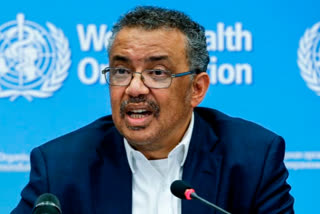Hyderabad: As the coronavirus has brought the world to its knees, it also threatens to throw advances in health off the track.
"All over the world the COVID-19 pandemic is causing significant loss of life, disrupting livelihoods, and threatening recent advances in health and progress," said the 2020 World Health Statistics, an annual check-up on health with a series of key indicators.
In some areas, according to the report, progress has stalled, and immunization coverage has barely increased in recent years, with fears that malaria gains may be reversed.
Tedros Adhanom Ghebreyesus, the World Health Organization chief, said, "The good news is that people around the world are living longer and healthier lives and the bad news is the rate of progress is too slow to meet the Sustainable Development Goals and will be further thrown off track by COVID-19."
There is an overall shortage of services within and outside the health system to prevent and treat noncommunicable diseases such as cancer, diabetes, heart and lung disease, and stroke.
Read:WHO launches COVID-19 mobile apps for health workers, general public
Service coverage in low- and middle-income countries remains well below coverage than in wealthier ones, as do health workforce densities.
In more than 40% of all countries, there are fewer than 10 medical doctors per 10,000 people.
Similarly, over 55% of countries have fewer than 40 nursing and midwifery personnel per 10,000 people.
Tedros said that the pandemic highlights the urgent need for all countries to invest in robust health systems and primary health care as the best defence against outbreaks like COVID-19.
"Health systems and health security are two sides of the same coin," he said.
The biggest gains were reported in low-income countries, which saw life expectancy rise 21% or 11 years between 2000 and 2016, compared with an increase of 4% or 3 years in higher-income countries.
Read:WHO says coronavirus may never go away!
One driver of progress in lower-income countries was improved access to services to prevent and treat HIV, malaria and tuberculosis, as well as a number of neglected tropical diseases such as guinea worm. Another was better maternal and child healthcare, which led to a halving of child mortality between 2000 and 2018.
Dr Samira Asma, WHO assistant director-general, said that the COVID-19 pandemic highlights the need to protect people from health emergencies, as well as to promote universal health coverage and healthier populations to keep people from needing health services through multisectoral interventions like improving basic hygiene and sanitation.
The inability to pay for healthcare is another major challenge. Approximately 1 billion people will be spending at least 10% of their household budgets on health care in 2020, according to WHO estimates. The majority of these people live in lower-middle-income countries.
It is to be noted that addressing these challenges is on the agenda for next week’s 73rd World Health Assembly, to be held online for the first time. The WHO will focus primarily on COVID-19, and the Member States will meet from May 18 to 19.
Also Read:WHO hails India for its strategy against Covid-19
